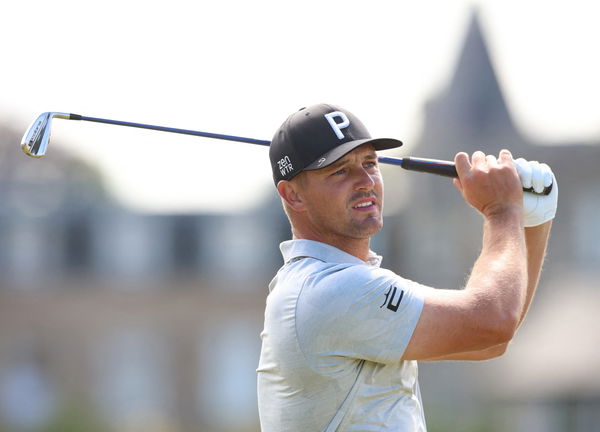

As the 2024 Paris Olympics approach, the world’s top golfers are gearing up to tee off in pursuit of gold. Yet, like any prestigious sporting event, controversy has woven its way into The Gentlemen’s Game. In this article, we’ll delve into the incidents that have added drama to this journey towards Olympic gold. Buckle up, because the road to victory is rarely smooth!
The top 5 most controversial moments in Olympic golf history are as follows:
ADVERTISEMENT
Article continues below this ad
5. Augusta National: Rural officials bailing out at the last moment
In the mid-90s, golf appeared poised to make a comeback to the Olympics after nearly a century-long absence. The 1996 Atlanta Games presented the perfect opportunity. Billy Payne, the future chairman of Augusta National, spearheaded the Atlanta Committee for the Olympic Games (ACOG) with his vision for golf’s inclusion.
Augusta National, home of the Masters, was slated to host the Olympic golf tournament. The R&A and USGA supported the proposal, and Augusta National Chairman Jack Stephens was enthusiastic. However, the plan faced significant opposition locally. The Atlanta City Council, a critical stakeholder, refused to approve Augusta National due to concerns that the club’s lack of diversity—having only one black member and no female members—contradicted the Olympic mission statement’s emphasis on equality.
This last-minute decision caused a significant stir in the golf world and raised questions about the suitability of Augusta National, the Masters venue, as an Olympic venue.
4. Golfers forced to withdraw due to COVID-19: 2020 Tokyo Olympics
The COVID-19 pandemic significantly impacted the 2020 Tokyo Olympics, and the golf competition was no exception. After a 12-month postponement, the qualifying period for the men’s Olympic golf competition finally concluded on Father’s Day in 2021.
Notable professionals withdrew from the competition due to positive tests or contact tracing such as Sergio Garcia, Lexi Thompson, Tyrrell Hatton, and Martin Kaymer. Dustin Johnson, who had previously committed to playing, also withdrew. Jon Rahm, the world’s No. 1 player at that time, agreed to represent Spain but COVID-19 tests threw a wrench in his ambitions.

via Reuters
Golf – The 2023 Ryder Cup – Marco Simone Golf & Country Club, Rome, Italy – September 26, 2023 Team Europe’s Jon Rahm during a press conference REUTERS/Phil Noble
Rahm tested positive in his third and final test required for Tokyo, he was then again tested three more times and each report came back positive. However, there were some bright spots. Rory McIlroy, who had skipped the 2016 Olympics due to the Zika virus, chose to represent Team Ireland instead of Great Britain. Justin Thomas, one of golf’s biggest stars, was also all-in for Team USA.
3. The 1908 London ‘Boycott’
The 1908 Olympics were originally planned for Rome, but after the eruption of Mount Vesuvius in 1906 strained Italy’s finances, the Games were relocated to London. But as per the PGA Tour media, the Olympic golf competition was spoiled by a boycott due to a miscommunication and disagreement over the definition of an “amateur” golfer. The British Olympic Committee claimed to have sent a letter to the R&A, golf’s governing body in Scotland, requesting their involvement in managing the event, but the letter was never received.
As a result, defending champion George Lyon was the only golfer who properly registered for the competition. He was offered the gold medal by default, but he turned it down due to the lack of competition. The 1908 London Olympics boycott led to a 108-year interval in Olympic golf, with the next gold medal being awarded to Justin Rose in 2016.
2. Bryson DeChambeau’s absence: 2024 Paris Olympics
The Scientist remains on the outside after missing out on the 2020 Tokyo Olympics, as a result of testing positive for the coronavirus. Bryson DeChambeau, once eligible as World No. 6, was excluded from the Paris Olympics despite his strong form in majors and LIV golf tournaments this year. He knew that it was coming, “It’s disappointing, but I understand the decisions I made, and the way things have played out has not been necessarily perfectly according to plan” said the two-time major winner.

USA Today via Reuters
May 18, 2024; Louisville, Kentucky, USA; Bryson DeChambeau talks with his caddie on the fourth green during the third round of the PGA Championship golf tournament at Valhalla Golf Club. Mandatory Credit: Adam Cairns-USA TODAY Sports
Even if he wanted to participate in the Olympic squad, he couldn’t, given his affiliation with the Saudi-backed league not being recognized by the Official World Golf Ranking (OWGR). The decision sparked controversy in the golf world, with many enthusiasts arguing that DeChambeau’s absence is nothing short of a failure for golf as a game. But the 30-year-old hoped to make it for the next Olympics, he said “Hopefully 2028 will be a little different situation, and it will make it that much sweeter.”
ADVERTISEMENT
Article continues below this ad
1. Dutch golfers barred from Olympics: 2024 Paris Olympics
In a shocking decision, Dutch Olympic officials decided to keep two male golfers, Joost Luiten and Darius Van Driel, and one female golfer, Dewi Weber, from the Paris Olympics due to their low world rankings. The Netherlands Golf Federation (NGF) presented extensive arguments and data to the Dutch Olympic committee, hoping to highlight the unique aspects of golf compared to other sports.
ADVERTISEMENT
Article continues below this ad
“According to them, it has not been demonstrated that there is a reasonable chance of a top-eight ranking during the Olympic Games,” the NGF stated. The decision followed a similar move during the 2020 Tokyo Olympics when Dutch players were not allowed to participate in the prestigious event. According to Dutch Olympic officials, golfers must be among the top 100 in the world or the top 36 in the Olympic ranking to compete. The decision has been met with widespread criticism, with many arguing that it is unfair to deny golfers the opportunity to represent their country on the world stage.
If you enjoyed revisiting these controversial moments, stay tuned for more in-depth coverage and updates on Olympic golf. What are your thoughts on these controversial moments? Share your opinions in the comments below!
ADVERTISEMENT
ADVERTISEMENT
ADVERTISEMENT
ADVERTISEMENT

